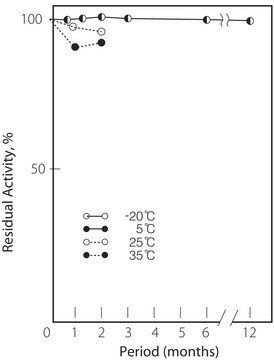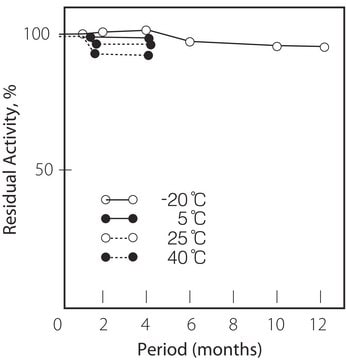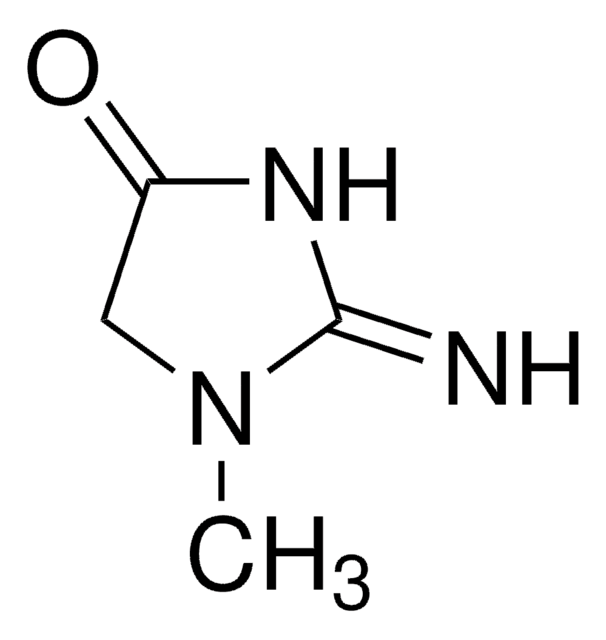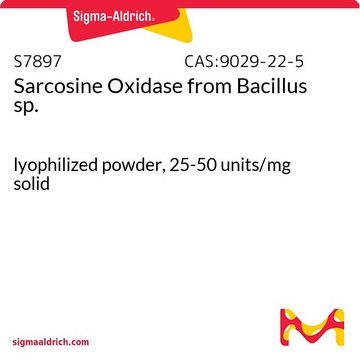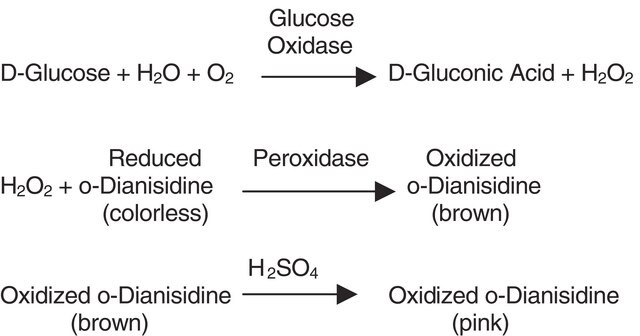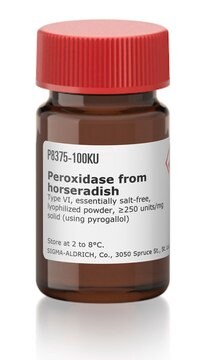C3921
Creatinase from Pseudomonas sp.
recombinant, expressed in E. coli, lyophilized powder, 10-15 units/mg protein
Synonym(s):
Creatine Amidinohydrolase
Sign Into View Organizational & Contract Pricing
All Photos(1)
About This Item
CAS Number:
EC Number:
MDL number:
UNSPSC Code:
12352204
NACRES:
NA.54
Recommended Products
recombinant
expressed in E. coli
Quality Level
form
lyophilized powder
specific activity
10-15 units/mg protein
mol wt
45 kDa
composition
Protein, ~70% biuret
storage temp.
2-8°C
Application
Creatine amidinohydrolase is a clinically important enzyme used in the determination of creatinine in blood and urine.
Biochem/physiol Actions
Creatinase is a homodimer with subunit molecular weights of approximately 45 kDa. It catalyzes the hydrolysis of creatine, in the presence of H2O, to form urea and sarcosine.
Unit Definition
One unit will hydrolyze 1.0 μmole of creatine to urea and sarcosine per min at pH 7.5 at 37 °C.
Signal Word
Danger
Hazard Statements
Precautionary Statements
Hazard Classifications
Resp. Sens. 1
Storage Class Code
11 - Combustible Solids
WGK
WGK 1
Flash Point(F)
Not applicable
Flash Point(C)
Not applicable
Personal Protective Equipment
dust mask type N95 (US), Eyeshields, Gloves
Choose from one of the most recent versions:
Certificates of Analysis (COA)
Lot/Batch Number
Don't see the Right Version?
If you require a particular version, you can look up a specific certificate by the Lot or Batch number.
Already Own This Product?
Find documentation for the products that you have recently purchased in the Document Library.
Pinar Esra Erden et al.
Artificial cells, blood substitutes, and immobilization biotechnology, 34(2), 223-239 (2006-03-16)
A new enzyme electrode for the determination of creatine was developed by immobilizing creatinase (CI) and sarcosine oxidase (SO). The enzymes were co-immobilized in a poly(vinylferrocenium) matrix onto the surface of a platinum working electrode. Crosslinking with glutaraldehyte (GA) and
Jason A Berberich et al.
Acta biomaterialia, 1(2), 183-191 (2006-05-17)
The enzyme creatine amidinohydrolase is a clinically important enzyme used in the determination of creatinine in blood and urine. Continuous use biosensors are becoming more important in the clinical setting; however, long-use creatinine biosensors have not been commercialized due to
N A Siddiqi et al.
Saudi journal of kidney diseases and transplantation : an official publication of the Saudi Center for Organ Transplantation, Saudi Arabia, 17(2), 203-207 (2006-08-15)
Polyoma virus nephropathy (BK virus) is being recognized as an important cause of graft failure. It is usually confused with acute rejection. No cases have been reported from the kingdom of Saudi Arabia. We report a case of a Saudi
Agnieszka Dzikowska et al.
Fungal genetics and biology : FG & B, 38(2), 175-186 (2003-03-07)
The arginine catabolism gene otaA encoding ornithine transaminase (OTAse) is specifically induced by arginine and is under the control of the broad-domain carbon and nitrogen repression systems. Arginine induction is mediated by a product of arcA gene coding for Zn(2)C(6)
Takashi Nakamura et al.
Bioscience, biotechnology, and biochemistry, 70(10), 2363-2370 (2006-10-13)
Aspergillus nidulans possessed 16 putative amylolytic genes consisting of 7 alpha-glucosidase (agdA-F), 7 alpha-amylase (amyA-F), and 2 glucoamylase (glaA and B) genes on the genome. Among them, the agdA, agdB, agdE, agdF, amyA, amyB, amyF, and glaB genes were induced
Our team of scientists has experience in all areas of research including Life Science, Material Science, Chemical Synthesis, Chromatography, Analytical and many others.
Contact Technical Service